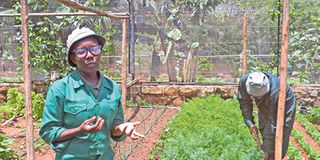Hotel: Why we’re happy growing our own food

Felister Orangi of Ololo Lodge in Ongata Rongai, in their herbs farm in Kajiado. She reckons that the hotel found inspiration to grow organic food from founder Craig Chapman, who also owns an organic farm back home. PHOTO | WINNIE LELEI | NMG
What you need to know:
- Ololo Lodge in Ongata Rongai in Kajiado County is one of the facilities that are growing their own food.
- Felister Orangi, an assistant farm manager at the lodge and a graduate of management with training in permaculture designs, says they farm on 12 acres
- Herbs such as mint and vegetables that include broccoli, coriander, sage, red cabbage and zucchini now flourish under the nets.
- To maintain the right ecological environment in the enclosed garden, the team keeps a swarm of stingless bees that help with the pollination process.
As it becomes increasingly harder to ascertain the quality of food sold in the market and as prices rise, several hotels have moved to producing their own vegetables, eggs, meat and milk.
Hotels are some of the biggest buyers of farm produce, but issues of misuse of pesticides among farmers, poor handling and storage of food are making some to choose the new path to get quality supplies.
Ololo Lodge in Ongata Rongai in Kajiado County is one of the facilities that are growing their own food.
Felister Orangi, an assistant farm manager at the lodge and a graduate of management with training in permaculture designs, says they farm on 12 acres.
“We started farming three years ago, though the hotel was established in 2013. We were motivated by the need to produce safe food that is free of harmful agents such as pesticides and to cut costs,” says Felister, noting they farm organically.
Felister reckons that the hotel found inspiration to grow organic food from founder Craig Chapman, an Australian who also owns an organic farm back home.
They grow a variety of vegetables in shade nets for all their kitchen needs, and keep hundreds of White cornish breed birds for meat and Isa Brown layers.
“We established the farms by importing loam soil and constructed sheds, not just to keep monkeys away but also to preserve moisture,” she says.
Herbs such as mint and vegetables that include broccoli, coriander, sage, red cabbage and zucchini now flourish under the nets. Along the edges of the garden are rosemary, roses as well as marigolds to help control pests.
“We are currently experimenting with garlic and chillies and have so far achieved positive results on lemon trees,” says Felister.
To maintain the right ecological environment in the enclosed garden, the team keeps a swarm of stingless bees that help with the pollination process.
The crops are supplied with worm juice, instead of the usual water, using drip pipes.
ORGANIC REMEDIES
“To produce the juice, the earthworms are fed on kitchen or farm waste like fruit peels, which they break down. We then pour water through the compost to end up with the liquid that is rich in nutrients but lacks oxygen. Once it seeps down from the compost bed, we collect and brew it,” says Felister.
“Brewing involves aerating the worm leachate by use of a device for at least six hours, then adding starch to it.”
Away from the vegetable farm, at the poultry section, the birds forage in an open area as they are kept organically. According to Felister, the chicken’s welfare comes first.
“When placed in a confined area, chickens are likely to suffer from problems caused by overcrowding. Chickens that are allowed to forage produce delicious meat and those that lay eggs produce better tasting ones,” she offers.

An employee of the farm collects eggs. The birds forage in an open area as they are kept organically. PHOTO | WINNIE LELEI | NMG
Other than what the chickens feed on in the eight hours they are allowed to free-range, they are also fed on grains and vegetables.
“We buy day-old chicks and nurture them,” says Leonard Ndua, the farm’s manager.
Since the birds are farmed organically, they do not use the normal vaccines, but natural medicines bought from certified organic medicine producers as well as their own-produced drugs.
“We produce our own organic remedies using aloe vera and chillies,” says Ndua, noting that there is a misconception that chickens that free-range are prone to diseases.
According to Ndua, free-range birds face little danger of spreading disease from one to another, unlike those enclosed in an area.
“But the chickens should be allowed to free-range within a given area that can be cleaned easily,” he says.
The chicken area is paddocked so that the birds are rotated, first to ensure forage is not depleted and second, to ensure that the chicken droppings fertilise the soil on the farm.
The farm supplies eggs, first to the hotel then to consumers through a marketing agency. A tray goes for Sh450 and each bird sells at Sh650.
Layla Liebetrue, the Project Lead for Route to Food Initiative, says ecological farming is the way to go as the country is at a crossroads, with the need to become food secure outweighing the need for food safety.
“Food security is not about production but whether the people can afford to buy and whether the quality of the food is suitable,” she says, adding that organic farming produces safer food.
****
Get it fast
The harvest
- They harvest half a tonne of salad greens, including mesclun salad, rocket, mustard, sorrel, baby spinach, mizuna and pak choi yearly.
- They also get 400kg tomatoes and a tonne of vegetables including red and white cabbage, green peppers, sukuma wiki, spinach, rhubarb, carrots, eggplant, squash, onions, broccoli, cauliflower and nasturtiums.
- They have also just started to produce fruits, getting approximately 100kg of tree tomatoes, passion fruits, bananas and citri.




